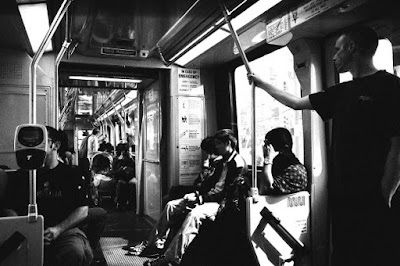 The current pressure on MUNI to “get tough” on fare evaders creates an even bigger sinkhole for public funds - and more tension on trains.
The current pressure on MUNI to “get tough” on fare evaders creates an even bigger sinkhole for public funds - and more tension on trains.This week Supervisor Bevan Dufty became the latest in the long line of public officials around the country to address the issue of MUNI fare evasion, an offense whose level of outrage seems to correlate to a city’s economic health. Dufty “is pushing to increase evasion citations by 50 percent, which would bring the fine for first-time offenders up to $75 from the current $50. Dufty is also suggesting fines of up to $250 and $500 for second-time and third-time violators, respectively.”
MUNI fares are in the news this month as the City’s economic woes bring pressure to bear on any municipal revenue stream, and the MUNI fare box has always been the subject of political tug-of-war between transit advocates who endorse cheap, plentiful transit as an incentive for citizens to stop using their polluting and sprawl-inducing cars so much, and fiscal conservatives who tend to indict transit as an exemplar of everything that is wrong about social democracy – an overpaid driver and an underpaid fare box leading the way inside a mobile aquarium of the working poor and ungovernable urban youth covered in magic marker ink, crack pipes, spilled coffee and lickspittle. The end result is that nobody seems to want to look at the issue in terms of how to effectively ameliorate the problem.
Concerns about fare evasion are rising in all major cities. That’s because we’re in a recession, and cities need money. The fact that fare evasion rises when everyone is under economic pressure makes it an even more convenient bugaboo that allows transit agencies to vent popular pressure while increasing fares. Enforcement schemes against fare evasion are indeed more often than not more expensive than the lost fare income itself, and in a culture where the public expectation of transit fares are still based upon the outdated notion that transit is primarily for the poor to lower middle class, you’ll never get away politically with bringing fares up to the level where they actually pay for service.
The stu
 pidity of fare evasion enforcement becomes even clearer when you combine the subsidy-vectored pressures of cities like San Francisco (where the rule against back-door boarding is broken literally hundreds of thousands of times per day out of common sense) with the individualistic cultures of Left Coast cities generally. Such schemes become characterized by the public as the urban equivalent of the old Southern “Speed Trap” as any hope to legitimize the policy goes out the window. End result: more fare evasion.
pidity of fare evasion enforcement becomes even clearer when you combine the subsidy-vectored pressures of cities like San Francisco (where the rule against back-door boarding is broken literally hundreds of thousands of times per day out of common sense) with the individualistic cultures of Left Coast cities generally. Such schemes become characterized by the public as the urban equivalent of the old Southern “Speed Trap” as any hope to legitimize the policy goes out the window. End result: more fare evasion.So whatever happened to Penalty Fares? Is it really more expensive to just make scofflaws pay their fare on the spot rather than process all those citations?
Now there’s an idea.
Discuss on The Wall: San Francisco Politics, Policy, and Government

1 comment:
We could increase the fines to a billion zillion dollars per ticket but I don't know that's the smartest way to balance a budget. Ironically as more people remember to pay via fast pass, translink or whatever, the amount raised from fines drops, therefore creating a budget hole etc etc etc.
As late as the early 80s, MUNI employed "Loaders" to collect fares and let people in the back doors so that the busiest lines ran faster and they collected more money up front. This was a common sight around the city at rush hour, but someone decided to cut some jobs and in the process, lost out on a chance to raise money the proper way, instead of using a posse of guards under pressure to make a quota of "tickets."
No transit system in the US can or does raise all its money from the farebox. If MUNI simply did a better job collecting, they'd at least have more money than they do now, and they wouldn't need a quasi-police force on every line. But alas, like most things in SF, common sense solutions take a back seat to grandstanding and talking.
Post a Comment